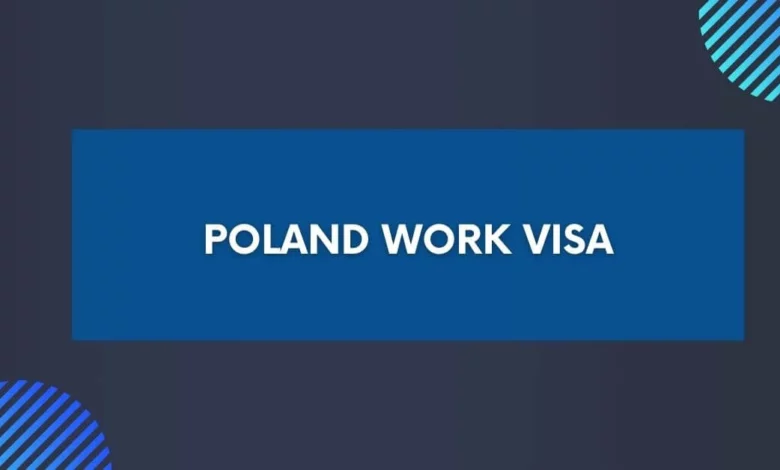Poland Work Visa 2024 – Visit Here

In 2024, a lack of skilled labor in numerous sectors of the Polish economy creates opportunities for foreign talent by providing desirable work visa alternatives for sought-after occupations. This article provides an in-depth analysis of the ever-changing Polish labor market, identifying significant areas of growth and providing assistance for individuals seeking employment in obtaining a work visa for Poland.
Do you earn an income of PLN 6130 (approximately $1460) per month? If so, the flourishing job market in Poland in 2024 presents a favorable opportunity for professional advancement and increased income. Poland, renowned for its average monthly salary of 6,130 PLN and its comparatively low unemployment rate of 5.82%, presents itself as an appealing location for job applicants from around the globe. The nation’s thriving economy has resulted in a rise in the number of millionaires (fact check), which suggests that there are abundant professional prospects in diverse industries.
Check Also: Japan Work Visa Process 2024 – Visit Here
Details of Poland Work Visa
Polish employment policy places a high value on domestic labor, but opportunities for foreign-qualified workers are abundant in specific sectors due to skill deficiencies. However, employment in Poland is contingent upon the acquisition of a Polish Work Visa. It can be difficult to navigate this process, but if you have the necessary qualifications and skills, you have a good chance of obtaining a rewarding job in Poland with a valid work and residence permit.
Types of Poland Work Visa
- Work Permit Type A for Poland: For occupations designated as “Shortage Occupation Jobs.”
- Permit to Work in Poland of Type C/E: For personnel of international firms with operations in Poland.
- Nomad Freelance Visa: Poland’s low cost of living and operations make it an ideal location for freelancers.
Benefits of Poland Work Visa
- Procurement of Employment Opportunities: Possession of a work visa for Poland enables unrestricted access to employment opportunities in the nation’s varied sectors, such as finance, engineering, IT, and healthcare, among others.
- EU Entry: A work visa for Poland frequently grants access to other EU countries within the Schengen Area, thereby facilitating travel and prospective employment opportunities in other member states, due to Poland’s membership in the European Union (EU).
- Excellent Quality of Life: Poland provides a rich cultural heritage, contemporary amenities, and comparatively affordable living expenses in comparison to other Western European nations, all of which contribute to its high quality of life.
- Stable Economic Conditions: The gradual expansion of the Polish economy has created a stable environment for business and employment prospects.
- Medical care and education: A work visa grants individuals and their families access to the esteemed healthcare and education systems in Poland.
- A Cultural Exploration: Working and residing in Poland offers a distinctive cultural encounter due to the country’s illustrious past, vibrant cultural scene, and enduring traditions.
- Language-Related Prospects: Although Polish is the official language, numerous businesses function in English, thereby creating prospects for individuals who do not speak Polish. Moreover, acquiring proficiency in Polish may expand one’s professional and social horizons.
- Constraints Regarding Permanent Residency: Long-term eligibility for permanent residency or citizenship in Poland may result from work visa-related employment, contingent on the fulfillment of particular criteria and requirements.
- Development of Professional Networking: Gaining international work experience and networking with professionals from a variety of industries are two advantages of working in Poland that contribute to one’s professional development.
- The Reunification of Families: Work visas frequently provide the opportunity for family reunification, enabling the visa holder’s spouse and children to accompany them to Poland.
Applying for Poland Work Visa
Your Polish employer will typically manage the application process for your Poland visa; however, you may be required to provide additional documentation and potentially pay the application fees.
List of Poland Work Visa
Presently, Poland is confronted with labor shortages across various sectors:
- Chefs
- Drivers
- Construction Finishers
- Handyman
- Welders
- Midwives and Nurses
- Financial Auditors
- Doctors
- Agricultural Workers
- General Labor in Construction
- Turners
- Fitters
- Porters
- Psychologists
- Forklift Operators
- Engineers
Significantly increasing your likelihood of obtaining a Polish work visa are your competencies or prior experience in these domains.
Finding Jobs in Poland as an International Applicant
- Online Job Boards: In 2024, international candidates seeking employment in Poland can utilize sites such as jobs.pl, indeed.pl monster and pracuj.pl to post openings.
- Establishing connections in Poland can yield significant opportunities.
- Recruitment agencies that specialize in visa procedures and job placement can be of great assistance.
The Polish labor market in 2024 presents a wide range of prospects for proficient foreign professionals. An individual possessing the requisite credentials and the readiness to navigate the intricacies of the visa procedure may commence a fruitful professional trajectory in Poland, where one can take advantage of the country’s favorable unemployment rate and competitive wages. Poland is a potential next stop for construction workers, healthcare professionals, and freelancers alike.
Frequently Asked Questions:
-
What is the basic salary in Poland?
The minimum gross wage per hour in Poland as of January 2023 amounted to 22.8 zlotys. As of July 2024, the minimum hourly wage will increase to 28.1 zloty gross, which is an increase of 4.6 zloty compared to the previous year.
-
Is Poland a good place to work?
Poland is a fast-growing economy that presents foreigners with attractive employment opportunities. Relocating to this country may present you with a series of benefits, like the low cost of living or access to high-quality medical services.
-
Is Poland cheap to live in?
The average cost of living in Poland is 3,500 to 6,000 EUR per year. This cost varies from city to city. Compared to cities like Gdansk, Katowice, and Poznan, the cost of living is higher in cities like Warsaw, Lodz, and Krakow. Poland’s capital, Warsaw, is the most expensive, while Poznan has the lowest cost of living.




